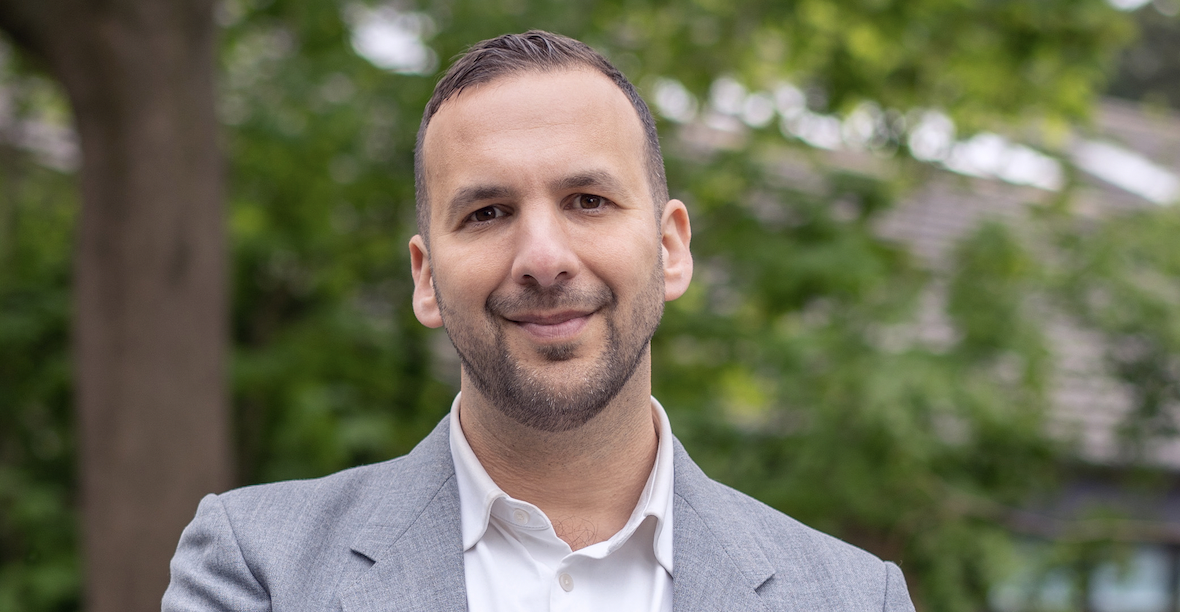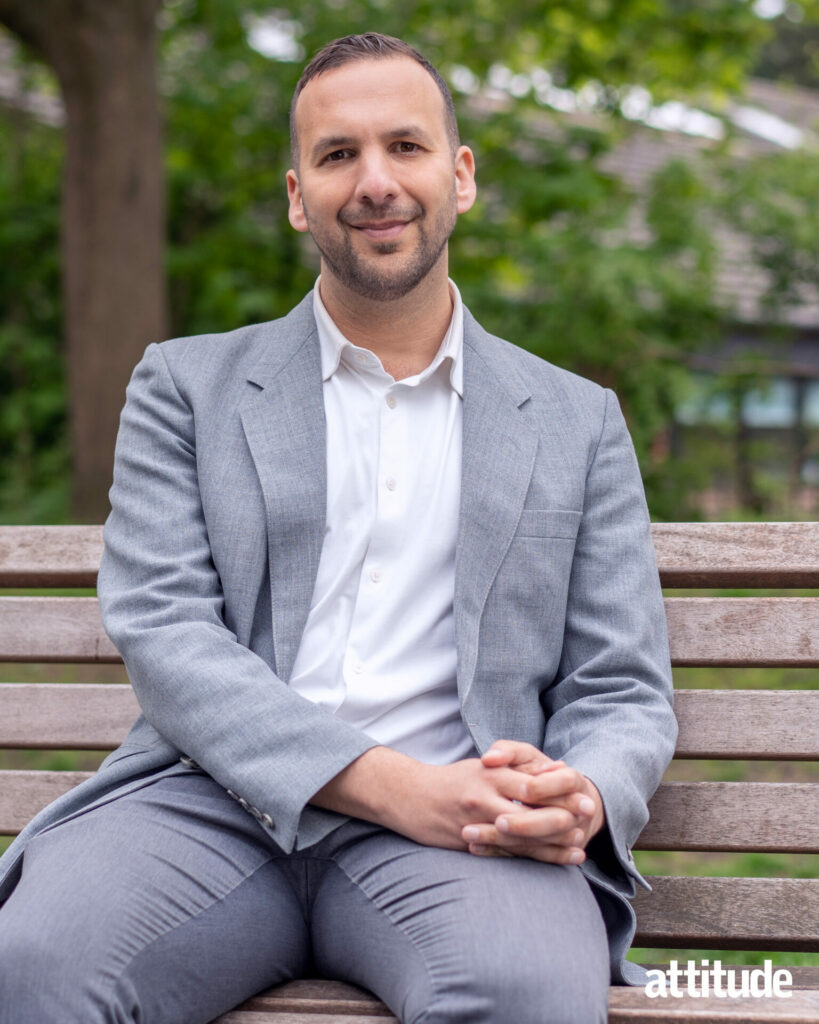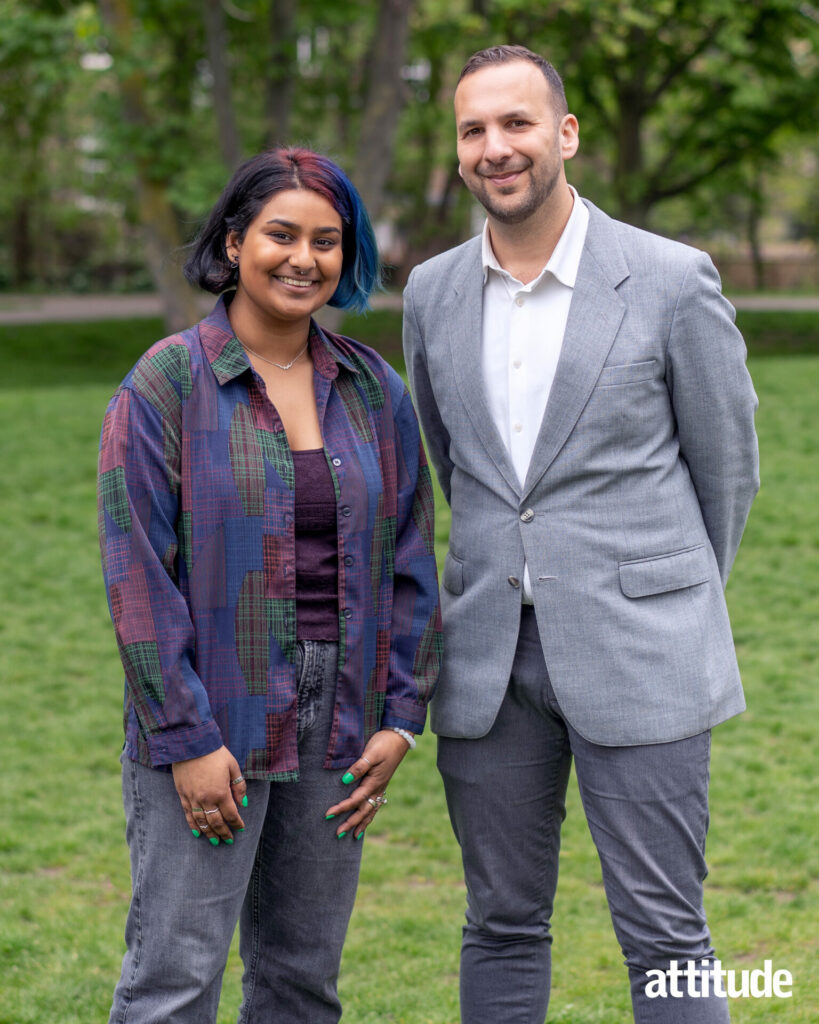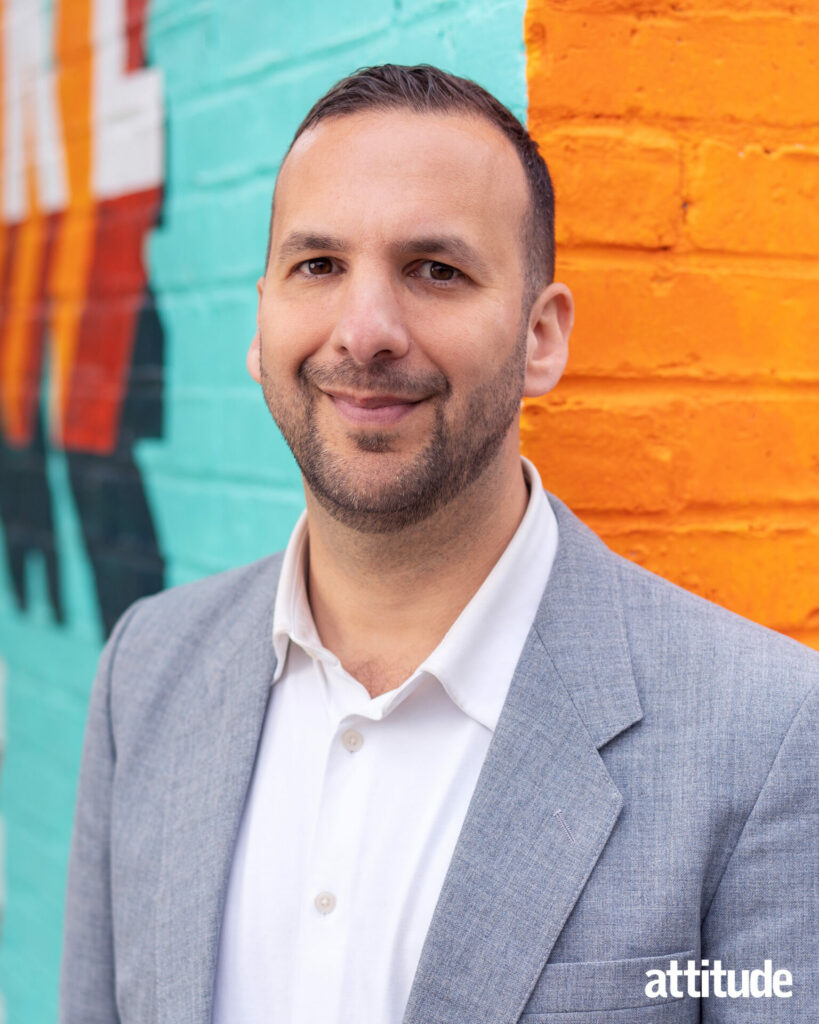Green Party’s deputy leader Zack Polanski interview: ‘There’s no LGB without the T’
Exclusive: "I feel like the Green Party is the party of hope"

From the moment we meet in Bethnal Green so that I can witness his typical working day, it’s clear Zack Polanski is a man who doesn’t stop for anything. After I admit to being scared of biking it around London, he quickly shows off a cycling injury on his hand. He doesn’t seem put off one bit by the incident. As well as being a keen cyclist, he’s vegan, doesn’t drink, and says he’s happiest when dancing.
Prior to becoming a member of the Green Party, Polanski was active in the Lib Dems. Even then, championing the environment was always his focus. “In terms of getting into green politics, something that’s cool for me about the Green Party is people know we care about the environment, and know we care about the planet. That is at the front and centre of everything we do. But there’s no environmental justice without social, racial and economic justice,” says Polanski. This is one of his go-to phrases throughout our chat. He believes all injustices link back to the environment. “[In] the poorest neighbourhoods in London, people are more vulnerable to road traffic accidents. Pollution is another really good example — the worst air pollution in our cities is often in places with working-class communities, or people of colour,” he adds.



Our day involves several pit stops, including a few short catch-ups around Westminster with former Green Party leader Natalie Bennett, current co-leader Carla Denyer, and another journalist who’s keen for time with Polanski too; he’s a man in demand. We also meet charities and unions before finally stopping off at a Borough pub for a much-needed end-of-the-day chat.
“There’s no environmental justice without social, racial and economic justice”
We begin with a catch-up with workers at a meeting of United Voices of the World, an independent grassroots trade union focused on supporting migrants, we tuck into a Spanish omelette whipped up on arrival (Polanski obviously declines) and bread, before Polanski takes part in an impassioned conversation with the team. He promises to attend an upcoming event with French MP Rachel Keke, who is a champion of collective action across the Channel.
Keke’s method of bringing change is something Polanski has had a lot of practice in. Prior to his political career, he worked largely with radical arts organisation Team Angelica. “Their co-creators Rikki Beadle-Blair and John Russell Gordon do a lot of work around ethnic minorities and LGBTQ+ work,” Polanski explains. “Rikki’s motto is that everyone has a story; a lot of it is about finding their stories and being able to tell them. A huge part of that has influenced my politics, because, ultimately, it’s about everyone feeling like they have equal access to power and everyone’s representation being important. A phrase I used the other day was: ‘If you’re not at the table, you’re on the menu.’ A lot of that philosophy came out through the community work I did, and also working in a theatre company like Team Angelica.”
Polanski also worked with Theatre of the Oppressed, which runs acting workshops to show people how to stand their ground against authority in real life. “It’s about how they could stay polite, but effective in challenging power. Whether that’d be landlords, police officers, teachers — anyone who might hold access to power that you want to challenge in an effective way, while still keeping your cool. I did a lot of that work.”
“If you’re not at the table, you’re on the menu”
Such past ventures prove Polanski’s desire to help the unheard have a voice, something he practises in his current role as the Green Party’s national spokesperson for Democracy and Citizen Engagement.
Throughout the day, Polanski proves himself to be not only knowledgeable and calm in his approach, but he clearly wants to listen and learn, too. He’s proactive and wants to be as present as possible, attending rallies and events, and regularly checking in with his Green colleagues.
As a member of the London Assembly, Polanski loves to challenge — and work with — Sadiq Khan. It clearly thrills him to faze the Mayor of London a little. He says he can always tell when he’s got to him in the chamber.
His campaigns as an Assembly member provide more proof that eco policy runs through everything Polanski does. For instance, he would like to see City Airport shut down.
“City Airport is mostly used by some very, very wealthy people,” he says. “The vast majority of people in the UK don’t fly at all. Of those people who do fly, a small number are flying very, very regularly, sometimes a couple times a week or a month. Green Party policy is for a frequent flyer levy.” Asked what that means, Polanski says, “Essentially, if people want to take a family holiday, we’re not here to be the ‘fun police’,” he continues. “If you need to do that, that’s totally acceptable. In fact, you would probably pay a little bit less if you’re just taking one holiday.”
“Green Party policy is for a frequent flyer levy”
For those who repeatedly take flights and make the most carbon emissions, “there’s a simple principle that the polluter pays and, ultimately, we need to make sure that rather than subsidising aviation we’re subsidising rail travel instead. How can we make it cheaper and quicker to get around Europe?”
Closer to home, Polanski also wants to introduce road-user charging in the capital, and says that more accessible public transport is key.
Unsurprisingly, as a gay man, he is passionate about LGBTQ+ rights: “We’ve seen when far right governments turn against Irish people, the GRT (Gypsy, Roma, Traveller) community, gay people in the 70s and 80s. I feel like trans people are the new culture war. It’s really important we recognise that when they come for one of us, they come for all of us. We need to stand in solidarity, and I’m proud to be part of a Green Party very clear that trans men are men, trans women are women and non-binary identities are valid too.”
“The Labour Party are making dog whistles around trans people”
Polanski labels the “playing politics” approach from the Labour Party as “abhorrent” when it comes to issues focused on the trans community. “Keir Starmer has tried to play both sides. LGBT+ Labour, I don’t blame them. It’s their leadership. One second, they’re tweeting positive LGBT+ messages, then the next minute, the Labour Party are making dog whistles around trans people. It’s really important that politicians are not just brave, but correct, and speak out on these issues.”
So why does he think Starmer has got so complacent and stuck with such an ambiguous stance? “He’s partly a white straight man from the establishment, he’s never experienced what it’s like to be othered,” Polanski notes. “There’s also 13 years of the Tories that we’re all desperate to see rid of. I can understand a reluctance to rock the boat sometimes. Ultimately, if a replacement of the Conservatives is something that’s just a little bit less conservative, I think we all deserve better than that.”
The day takes on a poignant note when Polanski visits queer homeless centre, The Outside Project, where members of the LGBTQ+ community who feel endangered, are homeless or ‘hidden’ homeless, and feel that they are on the outside of services, can drop in for a place to stay and to be part of a community. One woman, originally from Mexico, plays us a composition on the piano and shows us her art therapy work. Polanski remarks afterwards that “it felt like her worries melted away.”
“I’m the first gay, Jewish deputy leader in British history”
Polanski’s Jewish identity is extremely important to him too. He was actually born David Paulden but at the age of 18 decided to revert to his family’s original Jewish surname. It was changed to Paulden in the early 20th century to avoid anti-Semitism after his ancestors arrived in the UK from eastern Europe. He’s previously said it was important for him to find pride, not shame, in his identity. “I’m the first gay, Jewish deputy leader in British history; I feel the responsibility to stand up for minority groups, not just for communities that I represent, but all communities.”
Polanski lives with his boyfriend Richie, a hospice worker, who he tries to talk about “as much as possible”, particularly around young people. He explains the very important reasons why. “One, I love him dearly! It’s always nice and warm to talk about him. But two, I think representation is really important. It’s recognising that even a decade or two ago, people wouldn’t have the freedom that I have. It both respects people who came before me and continues to make things easier for people in the future. We know, for instance, that I do have certain privileges as a gay man, but there’s no LGB without the T.”
Away from politics, Polanski adores dogs and regularly dog-sits for friends. “People always ask me if I’m gonna have my own dog, [but] because of my schedule, running around the country a lot of the time, it just wouldn’t be fair on a little mutt,” he laughs.
“Lizzo for president!”
Polanski loves music and dance, and says both help give his brain a rest. “I love being able to listen to some music and switch the brain off for a few hours, and just enjoy things.” A recent musical highlight was an “amazing” Lizzo gig at the O2: “Her energy and absolute silliness, and approach to the work that she does, but also her very serious political and empowerment messages were really, really powerful. Lizzo for president! The fact that she can occupy that space in such an authentic, powerful way, I think, is moving to anyone.”
Another person he’d love to see as president is American politician and activist Alexandra Ocasio-Cortez, aka AOC, who he cites as his main inspiration. The pair both used to work in bars before going into politics. He likes the way she “sees things really clearly”, doesn’t speak in soundbites and has an obvious point of view. “She talks very powerfully on women’s rights, on LGBTQ+ allyship, and she speaks up on the climate. On almost any issue, go to AOC and she’ll probably be in the right place.” Even when the pair don’t agree on issues, he will “understand her workings out”. He adds: “She’s a phenomenal politician and, I’m really hoping, presidential material.”
Of course, there’s an abundance of incredible women in his own party. Meeting Denyer and Bennett, even for a short while, gives an insight into the open and consistent communication within the party. He calls Brighton, Pavilion MP Caroline Lucas “a beacon of hope” and adds that he admires her “willingness to be uncompromising, while still putting kindness and compassion at the heart of everything she does”.
“I feel like the party is the party of hope”
When we meet in early May, the local election season is in its final stages. Polanski has spent the past few weeks doorstepping potential Green voters and is confident the Greens will have upped their seats considerably. (Days later, he is proved right when the Greens achieve record gains.) He finishes off by recalling a visit to Lancaster, where a Green councillor showed off the city’s first fully accessible playground.
“It wasn’t just some of the equipment that was accessible — every single piece of equipment was accessible. It’s obvious that it should be that way, but far too often it’s not and that was genuinely moving,” he observes. Polanski says this is one of many tangible examples of how a Green councillor can make change in the community.
“I’m really excited. I feel like the party is the party of hope, and hope is not like buying a lottery ticket and then just sitting around and waiting for something to happen. Hopefully, it’s going to the ballot box and putting a cross in the Green Party [box] or taking the political action or a direct action. I’m just really excited to see people’s hope rise as they realise we really can do this and the changes in society it’ll make,” he concludes.
As I leave, he’s gearing up for a weekend appearance on Sky News’ Sophy Ridge on Sunday, where he’ll appear minutes after… Keir Starmer.
